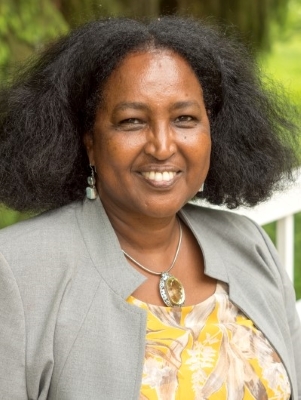By Alysha A. Cunningham

Prof. Amina Mire
Women of colour around the world are socialized into thinking that beauty means lighter skin. Through marketing, celebrity culture or social media filters, the aspiration to be brighter, lighter and glowing—encouraged throughout the cosmetics industry—continues to be fuelled by centuries-old racism.
Amina Mire, associate professor of Studies in Race and Ethnicity in Carleton’s Department of Sociology and Anthropology, has been vocalizing the harmful effects of these colonial constructs of beauty through her research for more than 20 years.
“Society has been so ingrained to believe that lighter skin means you are more intelligent, more civilized or modern,” explains Mire. “Those with lighter skin have held greater social standing. The message being sold is that darker-skinned women should aspire to be lighter.”
Addressing Hidden Dangers Behind Beauty Marketing
Through her work in biochemical practices in the global cosmetics and wellness industries, Mire was on the forefront in exposing the prominence of toxic skin-whitening products and the harmful marketing practices behind them. As consumers, women are, mostly unknowingly, putting themselves at risk of mercury poisoning and cancer all in the name of lighter skin, she says.
“This multibillion-dollar industry has been benefiting from the insecurities of marginalized women and in turn, continuing to promote harmful marketing practices that create those very same insecurities,” says Mire. “It’s a system that tells women you can fragment, correct and fix whatever part of your body that’s not good—including your skin.”
Mire’s strong interest in the skin-whitening phenomenon directed her career path from political theory to sociology. She says the shift happened serendipitously after discovering the prominence of skin-whitening products on the shelves of her then local, Toronto ethnic shop.
“I was quite horrified by the ingredients list and began asking shop owners and other women of colour if they were aware of the concrete health risks,” explains Mire. “Quite soon, I discovered how extensive the global industry was and I wanted to understand the sociological components as to why.”

Shifting Attitudes Towards Beauty
Mire’s criticisms of global cosmetic conglomerates, such as L’Oréal and Unilever, for their underlying racism met with minimal corporate response until the summer of 2020. With the rise of the Black Lives Matter movement at that time, there was a significant paradigm shift not only in industry, but the public understanding of esthetic beauty.
“People are now aware of the power of beauty and the dominant influence of Eurocentrism,” explains Mire. “But the work doesn’t stop. Beauty is not just a matter of subjective choice; it has material consequences. It’s time to take beauty seriously.”
Mire’s research has been featured worldwide, receiving increased exposure as countries began banning the harmful chemicals commonly found in skin-whitening products. The cosmetics industry was forced to pull products from shelves and a global rebranding strategy began to emerge. Marketing language shifted, but the intent and colourism behind the products remains the same, Mire says.
Blurred Lines Between Beauty and Wellness
 Mire is also discovering alarming links between the cosmetics industry’s skin-whitening approach and the $58-billion anti-ageing industry. She calls it the biomedicalization of ageing, where companies treat ageing as a medical problem that must be combatted or cured. Women are continually told that light, glowing skin is the standard to be achieved at all stages of life.
Mire is also discovering alarming links between the cosmetics industry’s skin-whitening approach and the $58-billion anti-ageing industry. She calls it the biomedicalization of ageing, where companies treat ageing as a medical problem that must be combatted or cured. Women are continually told that light, glowing skin is the standard to be achieved at all stages of life.
“The notion of whiteness in beauty has evolved and been rebranded into the larger wellness industry,” adds Mire, “meaning the lines between beauty, wellness and whiteness are even more blurred.”
Challenging these beauty standards is underway with the rise of companies such as Fenty Beauty and their inclusive shade ranges, celebrities vocalizing the damaging effects of the cosmetics industry like Alicia Keys and children’s films breaking the mold by featuring diverse casts, like in Encanto. But in Mire’s opinion, what took centuries to ingrain will take just as long to reverse.
“Eurocentric ideals are so entrenched that it will take more than two or three centuries into the future for people to just be themselves—a human being—and embrace all shapes, sizes, skin tones and body types as beautiful,” she says.
Wednesday, February 16, 2022 in Black History Month, Faculty of Arts and Social Sciences, Sociology and Anthropology
Share: Twitter, Facebook



